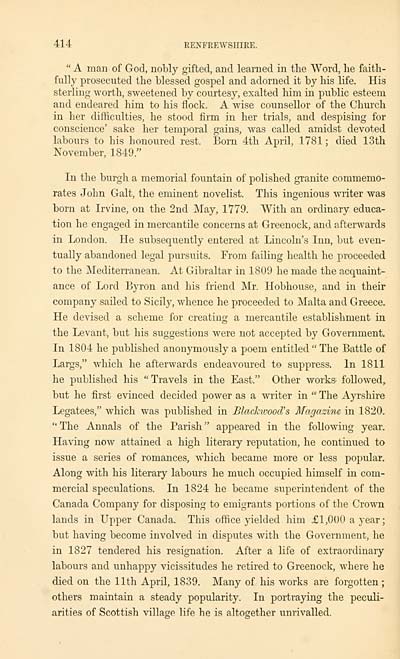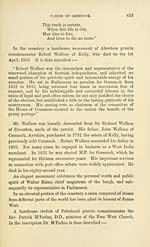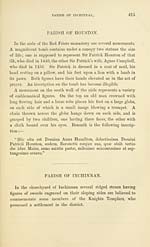Grampian Club > Monuments and monumental inscriptions in Scotland > Volume 1
(438) Page 414
Download files
Complete book:
Individual page:
Thumbnail gallery: Grid view | List view

414 EENFREWSHIRE.
" A man of God, nobly gifted, and learned in the Word, lie faith-
fully prosecuted the blessed gospel and adorned it by his life. His
sterling worth, sweetened by courtesy, exalted him in public esteem
and endeared him to his flock. A wise counsellor of the Church
in her difficulties, he stood firm in her trials, and despising for
conscience' sake her temporal gains, was called amidst devoted
labours to his honoured rest. Born 4th April, 1781 ; died 13th
November, 1849."
In the burgh a memorial fountain of polished granite commemo-
rates John Gait, the eminent novelist. This ingenious writer was
born at Irvine, on the 2nd May, 1779. With an ordinary educa-
tion he engaged in mercantile concerns at Greenock, and afterwards
in London. He subsequently entered at Lincoln's Inn, but even-
tually abandoned legal pursuits. From failing health he proceeded
to the Mediterranean. At Gibraltar in 1809 he made the acquaint-
ance of Lord Byron and his friend Mr. Hobhouse, and in their
company sailed to Sicily, whence he proceeded to Malta and Greece.
He devised a scheme for creating a mercantile establishment in
the Levant, but his suggestions were not accepted by Government.
In 1804 he published anonymously a poem entitled " The Battle of
Largs," which he afterwards endeavoured to suppress. In 1811
he published his "Travels in the East." Other works- followed,
but he first evinced decided power as a writer in " The Ayrshire
Legatees," which was published in Blackwood's Magazine in 1820.
" The Annals of the Parish " appeared in the following year.
Having now attained a high literary reputation, he continued to
issue a series of romances, which became more or less popular.
Along with his literary labours he much occupied himself in com-
mercial speculations. In 1824 he became superintendent of the
Canada Company for disposing to emigrants portions of the Crown
lands in Upper Canada. This office yielded him £1,000 a year;
but having become involved in disputes with the Government, he
in 1827 tendered his resignation. After a life of extraordinary
labours and unhappy vicissitudes he retired to Greenock, where he
died on the 11th April, 1839. Many of his works are forgotten ;
others maintain a steady popularity. In portraying the peculi-
arities of Scottish village life he is altogether unrivalled.
" A man of God, nobly gifted, and learned in the Word, lie faith-
fully prosecuted the blessed gospel and adorned it by his life. His
sterling worth, sweetened by courtesy, exalted him in public esteem
and endeared him to his flock. A wise counsellor of the Church
in her difficulties, he stood firm in her trials, and despising for
conscience' sake her temporal gains, was called amidst devoted
labours to his honoured rest. Born 4th April, 1781 ; died 13th
November, 1849."
In the burgh a memorial fountain of polished granite commemo-
rates John Gait, the eminent novelist. This ingenious writer was
born at Irvine, on the 2nd May, 1779. With an ordinary educa-
tion he engaged in mercantile concerns at Greenock, and afterwards
in London. He subsequently entered at Lincoln's Inn, but even-
tually abandoned legal pursuits. From failing health he proceeded
to the Mediterranean. At Gibraltar in 1809 he made the acquaint-
ance of Lord Byron and his friend Mr. Hobhouse, and in their
company sailed to Sicily, whence he proceeded to Malta and Greece.
He devised a scheme for creating a mercantile establishment in
the Levant, but his suggestions were not accepted by Government.
In 1804 he published anonymously a poem entitled " The Battle of
Largs," which he afterwards endeavoured to suppress. In 1811
he published his "Travels in the East." Other works- followed,
but he first evinced decided power as a writer in " The Ayrshire
Legatees," which was published in Blackwood's Magazine in 1820.
" The Annals of the Parish " appeared in the following year.
Having now attained a high literary reputation, he continued to
issue a series of romances, which became more or less popular.
Along with his literary labours he much occupied himself in com-
mercial speculations. In 1824 he became superintendent of the
Canada Company for disposing to emigrants portions of the Crown
lands in Upper Canada. This office yielded him £1,000 a year;
but having become involved in disputes with the Government, he
in 1827 tendered his resignation. After a life of extraordinary
labours and unhappy vicissitudes he retired to Greenock, where he
died on the 11th April, 1839. Many of his works are forgotten ;
others maintain a steady popularity. In portraying the peculi-
arities of Scottish village life he is altogether unrivalled.
Set display mode to: Large image | Transcription
Images and transcriptions on this page, including medium image downloads, may be used under the Creative Commons Attribution 4.0 International Licence unless otherwise stated. ![]()
| Publications by Scottish clubs > Grampian Club > Monuments and monumental inscriptions in Scotland > Volume 1 > (438) Page 414 |
|---|
| Permanent URL | https://digital.nls.uk/80695685 |
|---|
| Description | Vol. I. |
|---|---|
| Attribution and copyright: |
|
| Description | Note: Numbers 24-41 are relative to but not part of the Club's series. |
|---|---|

